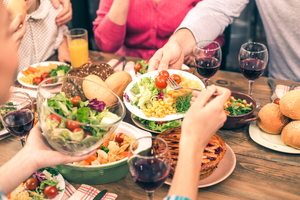People only have a limited amount of energy and ability to put out effort. That's why it's important to make your new healthy behaviors as easy as possible. Here are some tips on how you can make small, low-effort changes and turn them into habits. That way, you can build on them for sustainable weight loss.
Habits That Are Small Changes for Lasting Results
Just make one or a couple of small changes at once instead of trying to overhaul your entire life at one time. That can be more feasible for helping you lose weight and keep it off.
Here are a few examples of small changes that may fit into your lifestyle.
- Choosing lean ground turkey instead of ground beef
- Having water and a smaller soda instead of a larger soda
- Adding frozen vegetables when you heat up a can of soup
- Taking the stairs instead of the elevator
- Serving yourself onto a plate or bowl before eating instead of eating from a larger package
If you’re looking for changes you can make to lose weight, here are more than 100 ideas for creating a calorie deficit.
As your first small changes become easier, you can progress by adding new changes that are also realistic. You’ll continue to get more weight loss benefits as you make new healthy changes.
Habits for Meeting Needs More Healthily
Think about how you can create habits that meet your needs in healthier ways than how you may normally meet your needs. Needs can be of all types, such as physical, emotional, and social.
Here are some examples.
Eating a hard-boiled egg and a banana instead of a candy bar to satisfy hunger
Positive Approaches to Habit Building
It's easier to make changes and keep them up if you actually want to instead of feeling forced to. You can be more motivated to make a healthy choice in the moment if you can think of why you want the effects of that choice. Maybe you have long-term reasons, but there may be more immediate benefits to certain choices.
Here are some examples.
- You may feel proud if you bring a homemade lunch instead of going out
- A hard workout may help you be sharper at work that day
- Going outdoors during the day may let you sleep better at night
- Including protein and fiber at breakfast may reduce hunger throughout the morning
- Having a lighter dinner may reduce indigestion
Thinking about these types of benefits can make healthy choices feel like rewards rather than sacrifices.
Replace Old Habits with New Ones
Replacing old habits with new ones can make it easier to make changes. By doing so, you can avoid leaving a gap where the old habit was. Plus, there's already space available for a new habit.
An example might be if your old habit is to have dessert after dinner. A new habit might be to have a piece of fruit instead of dessert. The time to eat that fruit is already set aside after dinner, and enjoying fruit can become a new signal to your brain that your meal is ending.
Automaticity: Keep Trying!
Establishing habits can be a long process. To keep your healthy habits sustainable once you've formed them, it's best to establish automaticity. That means you perform the new habit automatically, without thinking about it. That way, you're spending less time and energy on weight loss while getting the same results.
Here are some examples of behaviors that you can turn into effortless habits.
- Putting your walking shoes at the door each night so they’re ready for you in the morning
- Substituting a bit of cinnamon for half the sugar in recipes
- Using sour cream instead of butter when baking, or olive oil instead of butter when cooking
- Checking nutrition labels at the supermarket when selecting foods
- Filling up your plate with green salad before looking at other options at a buffet
Here are some tips for developing automaticity for a behavior, using an example of having 2 servings of vegetables at dinner each night.
- Set a clear goal, such as having 2 servings of vegetables at dinner
- Identify a habit you can replace, such as having potatoes or rice as a side dish
- Make the items you need accessible, such as always having a selection of vegetables in the fridge or freezer and having them on a grocery list
- Use a visible reminder, such as placing notes on the fridge door and a box of rice in the pantry to remind you to prepare vegetables
- Make it easier to prepare vegetables for serving, such as cutting fresh vegetables on weekends, purchasing bagged salads, and making extra amounts some nights so you can have leftovers for 1-2 more days
- Make the choice as desirable as possible, such as finding new, delicious recipes for your vegetables
Keep in mind that it can take performing a behavior 10-20 times to establish a habit. It can take 60 or more times to turn that habit into an automatic event. Until then, you’re likely to forget to perform the new action several times.
Using the same example of wanting to have vegetables at dinner, here are some instances when you might not have your intended 2 servings at dinner.
- You forget to purchase them
- You forget to prepare them ahead of time and don’t have time to prepare them when you’re heating up dinner
- You don’t include them when planning meals like pasta with shrimp and olive oil or chicken fried rice
- You go out to dinner and forget to order vegetables or a salad
Once your healthy habits are automatic, healthy eating and weight loss can be easier.
Start making small changes today to lose weight and feel your best. Remember, your Lark coach is here to help every step of the way!
Not a member? See if you qualify today!











.webp)







